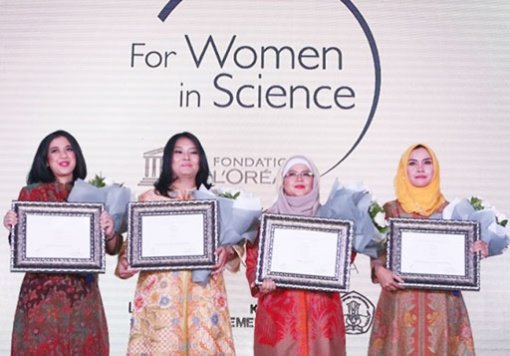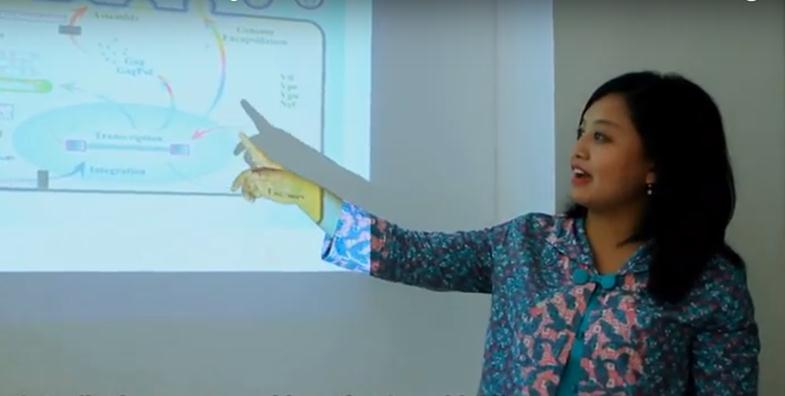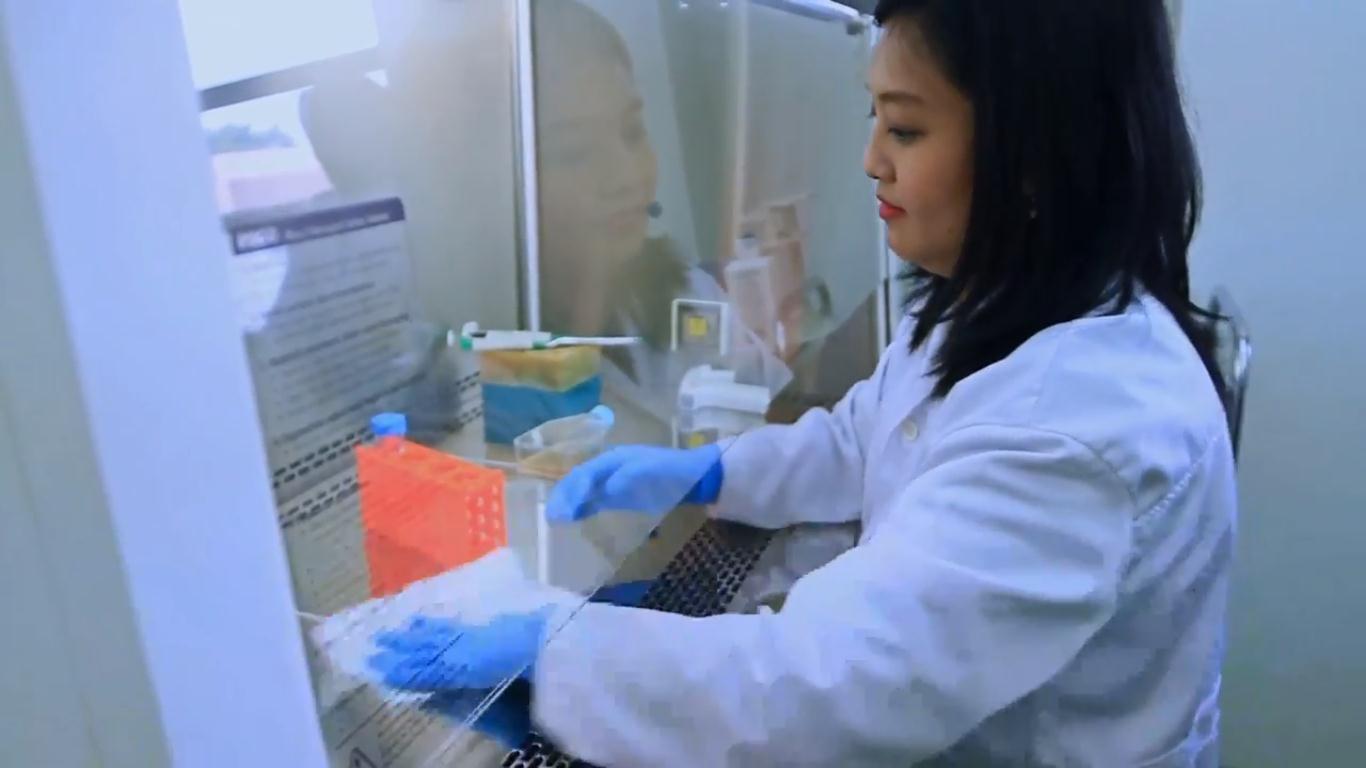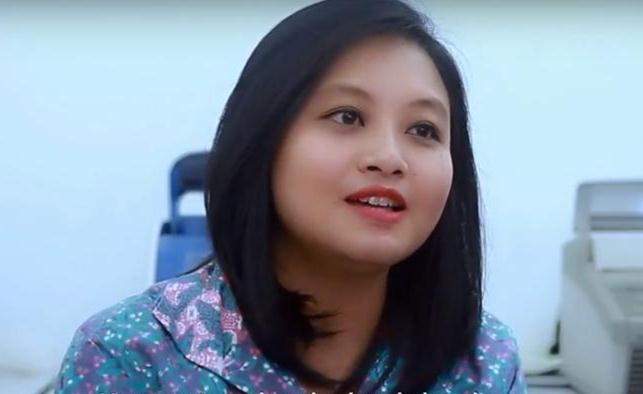Dr. rer. nat. Aluicia Anita Artarini: Chosen Inspirational Researcher of L'Oreal–UNESCO For Women in Science National
By Fatimah Larassati
Editor Fatimah Larassati

 BANDUNG, itb.ac.id - The role of women in the realm of scientific research is still relatively low in Indonesia. This issue, being a serious concern to L'Oreal, encouraged the organization to partner with Indonesian National Commission for UNESCO as well as Ministry of Education and Culture of the Republic of Indonesia to launch L'Oreal-UNESCO For Women in Science (FWIS) National annually. This program was established to appreciate talented women researchers who are pursuing or have graduated from doctoral degree. In FWIS 2015, one of the inspirational women researchers who were granted the honor was Dr. rer. nat. Aluicia Anita Artarini, a lecturer of School of Pharmacy (SF) ITB known for her research in the development of a new system for antiinfluenza drug discovery.
BANDUNG, itb.ac.id - The role of women in the realm of scientific research is still relatively low in Indonesia. This issue, being a serious concern to L'Oreal, encouraged the organization to partner with Indonesian National Commission for UNESCO as well as Ministry of Education and Culture of the Republic of Indonesia to launch L'Oreal-UNESCO For Women in Science (FWIS) National annually. This program was established to appreciate talented women researchers who are pursuing or have graduated from doctoral degree. In FWIS 2015, one of the inspirational women researchers who were granted the honor was Dr. rer. nat. Aluicia Anita Artarini, a lecturer of School of Pharmacy (SF) ITB known for her research in the development of a new system for antiinfluenza drug discovery.  Known as a virus with high mutation rate, influenza frequently induces resistance to existing antiviral treatments. The new characteristic of the mutated virus is unable to be detected by the same drugs, causing recovery to be less effective. To cope with this problem, the medicine for influenza should be continuously renewed, which is not favorable since drug research costs a decent amount of time and money. Therefore, Dr. Anita became interested in developing a new method of discovering antiinfluenza drug that is suitable to be implemented in Indonesia. She explained, "With this system, the research for new medication will not directly require the virus, we only need to use certain enzymes from the virus which have low mutation rate." The advantage of using enzymes in this method is the lower risk of hazard compared to using the virus itself. "If we directly use the influenza virus, there is a high probability that the researchers will also be infected," Dr. Anita added.
Known as a virus with high mutation rate, influenza frequently induces resistance to existing antiviral treatments. The new characteristic of the mutated virus is unable to be detected by the same drugs, causing recovery to be less effective. To cope with this problem, the medicine for influenza should be continuously renewed, which is not favorable since drug research costs a decent amount of time and money. Therefore, Dr. Anita became interested in developing a new method of discovering antiinfluenza drug that is suitable to be implemented in Indonesia. She explained, "With this system, the research for new medication will not directly require the virus, we only need to use certain enzymes from the virus which have low mutation rate." The advantage of using enzymes in this method is the lower risk of hazard compared to using the virus itself. "If we directly use the influenza virus, there is a high probability that the researchers will also be infected," Dr. Anita added.
In general, influenza viruses' genetic compositions have rapid mutation rate. However, the enzymes involved in genetic replication tend to be the same. These facts inspired Dr. Anita to look for potential substance that could inhibit the enzymes so that the viruses could not replicate. If the substance is able to inhibit the enzymes, it has high potential to resolve influenza issues. A lot of biological resources can be studied to find this potential inhibitor substance. Dr. Anita utilized the wide range of Indonesia's biodiversity to seek for a potential inhibitor substance in microorganisms or Indonesian herbal plants.
Limited Technology Is Not an Obstacle Dr. Anita admitted that Indonesia's research facilities are still incapable to support research involving microorganism. One of the most crucial factors is high laboratory hygiene and sanitation level. However, this problem was not an issue for her to contribute in biotechnology sector in Indonesia. The doctoral graduate of Humboldt University of Berlin transformed this unfavorable situation to become an inspiration to innovate a new suitable system for Indonesia. Her idea was regarding the use of enzymes to reduce the risks of directly using viruses in experiments. In addition, the use of Indonesia's natural resources and the use of experimental systems adapted to Indonesian laboratories' conditions allow industries to produce medicine with less cost. Therefore, this innovation can be a solution for problems regarding biotechnology medication and can also give a positive impact on the independence of Indonesia's pharmaceutical industry.
Dr. Anita admitted that Indonesia's research facilities are still incapable to support research involving microorganism. One of the most crucial factors is high laboratory hygiene and sanitation level. However, this problem was not an issue for her to contribute in biotechnology sector in Indonesia. The doctoral graduate of Humboldt University of Berlin transformed this unfavorable situation to become an inspiration to innovate a new suitable system for Indonesia. Her idea was regarding the use of enzymes to reduce the risks of directly using viruses in experiments. In addition, the use of Indonesia's natural resources and the use of experimental systems adapted to Indonesian laboratories' conditions allow industries to produce medicine with less cost. Therefore, this innovation can be a solution for problems regarding biotechnology medication and can also give a positive impact on the independence of Indonesia's pharmaceutical industry.
FWIS Support Women Researchers to Contribute
"Basically, FWIS aims to support Indonesian women who give contribution in the field of science. In 2015, there were two categories which were supported-life sciences and material sciences. Meanwhile in 2016, there will be two addtitional categories, which are engineering and mathematics," Dr. Anita said. Amongst four chosen outstanding women researchers of FWIS 2015, there was also Sastia Prama Putri, Ph.D. who is from ITB as well. The lecturer of School Of Life Sciences and Technology (SITH ITB) and professor assistant in Osaka University proposed a research to standardize the quality of Civet coffee as an effort to optimize its export potential as the most expensive coffee in the world. Both talented researchers were given honors in the life sciences category of FWIS 2015.
 Paradigm of low women researchers' population is commonly caused by a lack of young Indonesian women who are interested to continue their studies to a higher degree. "Hopefully, women researchers in Indonesia would not easily give up despite the inadequacy of Indonesia's research facilities because there are still a lot of potentials in Indonesia that have not been explored yet. As a researcher, woman tends to be more diligent and willing to pass on their knowledge to research institutions, education institutions, as well as home environment," Dr. Anita added as she concluded the interview.
Paradigm of low women researchers' population is commonly caused by a lack of young Indonesian women who are interested to continue their studies to a higher degree. "Hopefully, women researchers in Indonesia would not easily give up despite the inadequacy of Indonesia's research facilities because there are still a lot of potentials in Indonesia that have not been explored yet. As a researcher, woman tends to be more diligent and willing to pass on their knowledge to research institutions, education institutions, as well as home environment," Dr. Anita added as she concluded the interview.
Photo Courtesy: L'Oreal Indonesia
Translated by
ITB Journalist Apprentice 2016
Citta Santi (Pharmaceutical Sciences and Technology 2013)

.jpg)
.png)
.jpg)
.jpg)
.jpg)


.jpg)